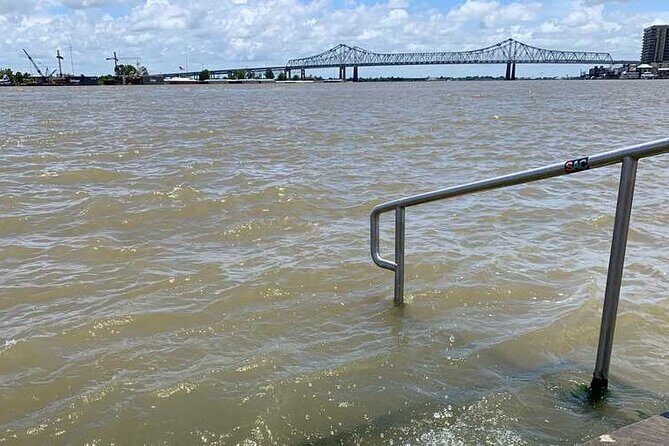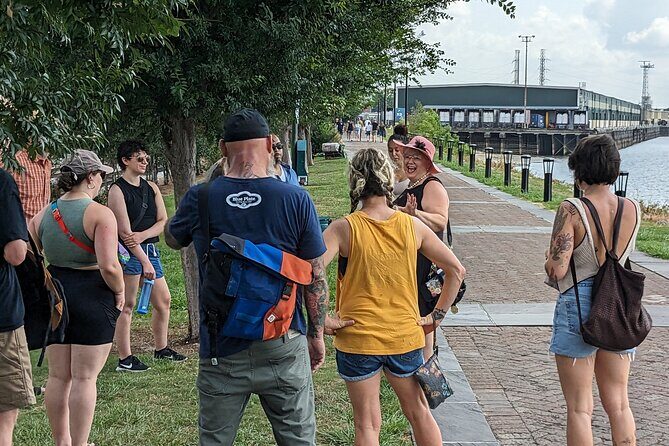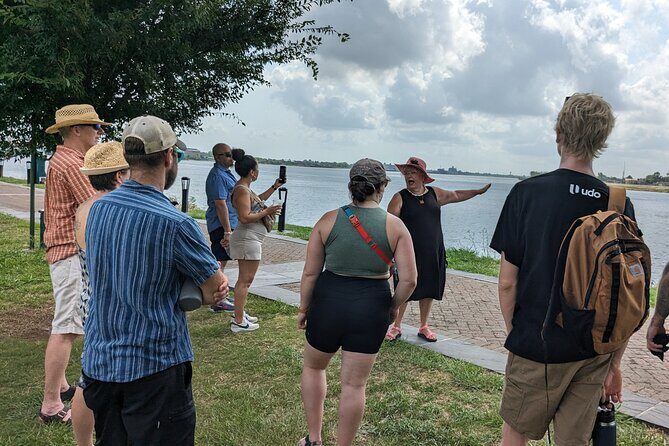Waters of Katrina History Tour: Exploring Water, Floods, and Resilience in New Orleans
If you’re looking to understand how water has shaped New Orleans’ identity, this Waters of Katrina History Tour is a solid choice. Priced at $30 per person, this approximately 2-hour journey takes you through some of the city’s most iconic water-related sites, from the mighty Mississippi River to historic parks and the French Quarter. Led by knowledgeable guides (we hear the tour starts at 10 am), this tour offers a blend of history, engineering, and local culture that will deepen your appreciation of how water has defined New Orleans—and how the city continues to adapt to its watery surroundings.
What we really love about this experience is how accessible and engaging it is. First, the itinerary is well-paced, with short stops that keep your attention without feeling rushed. Second, you’ll get to see key landmarks like Jackson Square and the French Market, but with a new perspective — understanding the water challenges they’ve faced over centuries. One possible downside? The tour is weather-dependent, so if a storm rolls in, it could be canceled, requiring flexibility. This experience is perfect for travelers who enjoy learning the stories behind a city’s infrastructure and culture, especially those curious about New Orleans’ flood history and resilience.
Who will love this tour? It suits those with an interest in history, urban development, or water management. It’s also great for travelers who prefer a relaxed pace with plenty of walking and storytelling, rather than a high-energy or action-packed experience.
Key Points

- Water and Culture: Water has shaped New Orleans’ geography, economy, and culture for centuries.
- Historical Insights: The tour offers detailed stories of flood threats, urban engineering, and resilience efforts.
- Iconic Sites: You’ll visit Jackson Square, French Market, and parks transformed from flood walls and warehouses.
- Educational Focus: Learn about the city’s early water systems and ongoing challenges with floods and storms.
- Accessibility: The tour is suitable for most travelers, with a mobile ticket and near public transportation.
- Balanced Experience: Free cancellation and moderate group size (up to 14 travelers) add to its appeal.
An In-Depth Look at the Waters of Katrina History Tour
Interested in history? Here are other past-focused experiences we've examined in New Orleans
Starting Point: Connecting Water and City at 768 Decatur Street
The tour begins in the heart of the French Quarter, at 768 Decatur St. We loved how this central location makes access easy, whether you’re arriving on foot, by streetcar, or other public transit options. From the moment we met our guide, the focus was on revealing the stories behind how water has been both a lifeline and a threat to New Orleans.
Mississippi River: The Lifeblood and a Flood Risk
Our first stop takes us directly to the Mississippi River, a force that has both powered the city’s economy and caused devastating floods. We appreciated how the guide explained that the river’s influence extends beyond shipping and trade to the very risk of flooding. Expect to hear about the natural flow of this mighty waterway and the careful engineering, such as levees, built to contain it. A quote from travelers captures this: “We loved the way the guide explained the river’s dual role — vital yet dangerous.” This stop lasts about 15 minutes and is free of charge, giving us a solid foundation for understanding the city’s water history.
Latrobe Park: Honoring the First Water System
Next, we moved to Latrobe Park, named after Benjamin Latrobe, who was responsible for building New Orleans’ first water system. It’s a small but meaningful site that connects the city’s early engineering efforts to today’s flood defenses. The 15-minute stop here offers a quiet break and a chance to reflect on how infrastructure has evolved. It’s a reminder that water management is an ongoing story for the city.
Woldenberg Riverfront Park: Transforming Industry into Public Space
We then strolled over to the Woldenberg Riverfront Park, a transformation from industrial warehouses and flood walls into a lush, public area. This change exemplifies how New Orleans has reimagined its relationship with water and the river. The park’s history, including its opening before the 1984 World’s Fair, highlights the city’s efforts to turn flood-prone areas into accessible green spaces. We liked the park’s blend of art, greenery, and history, which makes it a peaceful yet meaningful spot to understand the city’s resilience.
- Louisiana: Adults-Only Small-Group Ghost & Vampire Tour
- New Orleans: City & Cemetery Tour by Air-Conditioned Minibus
- Alligator Swamp Tour by Gray Line New Orleans
- French Quarter Ghosts & Voodoo Mysteries of NOLA Revealed
- Crescent City Christmas: A Festive Tour of New Orleans
- French Quarter Tour with Local Guide and Creole Stories
Jackson Square: Historic Heart of the City
The tour’s highlight is a visit to Jackson Square, a central location since 1721. As our guide told stories of the original city planning by French engineers, we gained insight into how the city’s founders struggled with controlling the Mississippi’s floods. The square’s iconic status is woven into the story of water’s influence on the city’s growth. This stop, about 15 minutes long, provides a scenic backdrop for understanding the city’s colonial roots and the ongoing battle with water.
French Market: From Native American Trading Post to Cultural Hub
The French Market has a history stretching back to 1791 as a Native American trading post. It evolved into a place where European, African, and Caribbean cultures mingled, offering everything from spices to crafts. This spot illustrates how water routes facilitated commerce and cultural exchange, shaping the city’s diverse identity. A 15-minute walk here offers vibrant sights and a deeper sense of the city’s multicultural roots.
The French Quarter: A Long Battle with the Mississippi
Finally, the tour takes us into the French Quarter, the original settlement, where man-made levees have attempted to tame the Mississippi. Our guide explained that despite efforts, floods have always been a threat — even Mark Twain famously observed that “The Mississippi River will always have its own way.” This 45-minute exploration is packed with stories of flood dangers, engineering endeavors, and community resilience. It’s the most in-depth part of the tour, offering a layered understanding of the ongoing struggle to live below sea level.
Ending Back at the Starting Point
The tour concludes where it began, giving us the chance to revisit the vibrant streets with new insights about how water and city life are intertwined. We appreciated how the tour balanced storytelling with site visits, making history feel tangible.
What Travelers Say and Why It Matters

Though the tour currently has no reviews, based on the detailed itinerary and focus, you might find it highly educational and inspiring. The emphasis on water engineering, flood resilience, and cultural adaptation means you’ll come away with a richer understanding of how New Orleans has thrived despite its watery challenges.
Practical Details and Value
At $30, this tour offers a cost-effective way to deepen your knowledge of New Orleans beyond the usual sights. The small group size (up to 14) ensures a more personal experience, while the free cancellation policy adds peace of mind. The two-hour duration is just right — enough to explore key sites without feeling rushed, and the fact that it’s accessible via public transit makes it easy to include in your day.
Why It’s Worth Considering
If you’re interested in urban water management, history, or architecture, this tour provides a look behind the scenes of New Orleans’ ongoing efforts to live with water. It’s especially suitable for travelers who enjoy storytelling, walking, and learning about local engineering solutions.
Final Thoughts
This tour isn’t about sightseeing for sightseeing’s sake; it’s about understanding how water has shaped—and continues to shape—New Orleans’ identity. You’ll leave with a deeper appreciation of the city’s resilience, its challenges, and its ongoing dance with the Mississippi River.
Frequently Asked Questions

How long is the Waters of Katrina History Tour?
It lasts approximately 2 hours, with stops at six different sites around downtown New Orleans.
What is the starting point for the tour?
The tour begins at 768 Decatur Street, a central location in the French Quarter.
What is the cost of the tour?
The tour costs $30 per person, which is quite reasonable for a guided experience that covers so much history and insight.
Are there any age restrictions?
Most travelers can participate, and service animals are allowed, making it accessible for most visitors.
Is the tour suitable for people with mobility issues?
Since the main activities involve walking between sites, it’s best suited for those who are comfortable with moderate walking.
What should I bring?
Comfortable shoes, sun protection, and water are recommended, especially if the weather is warm or rainy.
Can I cancel the tour if my plans change?
Yes, you can cancel up to 24 hours in advance for a full refund, which is helpful if weather or schedules change.
Is this tour family-friendly?
Yes, it’s suitable for most ages, especially those interested in history or engineering.
What makes this tour different from other New Orleans experiences?
It offers a focused look at water’s role in shaping the city, integrating history, engineering, and culture — not just sightseeing.
How many people typically join the tour?
The group size is limited to 14 travelers, ensuring a personal and engaging experience.
To sum it up, the Waters of Katrina History Tour provides an insightful, accessible look at how water has influenced New Orleans’ development and resilience. Ideal for history buffs, engineering enthusiasts, and curious travelers alike, it offers a meaningful way to connect with the city’s past and present. Expect engaging stories, beautiful sites, and a deeper understanding of why water remains central to New Orleans’ identity.
More Historical Tours in New Orleans
- Historical Tour and Musical Show at Dew Drop Inn New Orleans
- New Orleans Jingle Bells, Booze, History, Paranormal and Voodoo Walking Tour
- Private New Orleans Neighborhood Food Tour – Historic Driving “Dine-Around”
- New Orleans Small Group Garden District History and Architecture Tour
- Historic Garden District Walking Tour
- New Orleans French Quarter and Voodoo History Walking Tour
More Tours in New Orleans
- New Orleans City Sightseeing Hop-On Hop-Off Bus Tour
- Explore Oak Alley Plantation Guided Tour with Transportation
- Explore New Orleans: Self-Guided Audio Tour
- Oak Alley Plantation and New Orleans City Tour
- Spirits of the French Quarter: A Halloween Special Event Tour
- Airboat Swamp and Destrehan Plantation Tour from New Orleans
More Tour Reviews in New Orleans
- Fly a Plane in New Orleans: No Experience or License Required
- New Orleans City Sightseeing Hop-On Hop-Off Bus Tour
- Explore Oak Alley Plantation Guided Tour with Transportation
- French Quarter Small-Group Cocktail and Foodie Crawl
- Explore New Orleans: Self-Guided Audio Tour
- Oak Alley Plantation and New Orleans City Tour
More New Orleans experiences we've covered
- Fly a Plane in New Orleans: No Experience or License Required
- New Orleans City Sightseeing Hop-On Hop-Off Bus Tour
- Explore Oak Alley Plantation Guided Tour with Transportation
- French Quarter Small-Group Cocktail and Foodie Crawl
- Explore New Orleans: Self-Guided Audio Tour
- Oak Alley Plantation and New Orleans City Tour
- VIP Private Uncensored Wicked Spirits Pub Crawl
- New Orleans Departure Chauffeur Driven Transport by Executive SUV
- Spirits of the French Quarter: A Halloween Special Event Tour
- Airboat Swamp and Destrehan Plantation Tour from New Orleans
- New Orleans Ghosts Boos and Booze Haunted Pub Crawl
- Manchac Swamp EXTENDED Kayak Tour with Pickup
